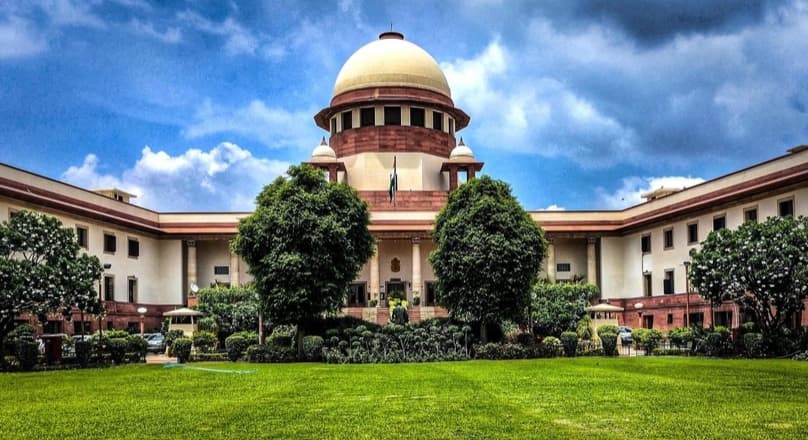
SC Restores Muslim Man's Citizenship, Says State Can't Randomly Suspect People
‘Just an allegation or accusation cannot lead to the burden shifting to the accused suspected to be a foreigner’: Supreme Court
More than 12 years after a tribunal in Assam declared a Muslim man to be a foreigner, the Supreme Court on Thursday restored his citizenship, ruling that a "grave miscarriage of justice" had occurred in the case.
A Bench of Justice Vikram Nath and Justice Ahsanuddin Amanullah noted that the pleadings and record were silent regarding the basis on which the police initiated proceedings against Md Rahim Ali in 2004.
"In this case, it is mentioned that an inquiry revealed the appellant had illegally migrated to Assam from Bangladesh after 25.03.1971, but there is no evidence on record to support this allegation, except for the claim that he illegally migrated to India post 25.03.1971.
It is also unclear who, if anyone, alleged that the appellant had migrated from Village - Dorijahangirpur, Police Station - Torail, District - Mymansingh in Bangladesh," the Court stated.
The Court further observed that it was the duty of the police to provide details on how they had obtained information that Ali had come to Assam from Bangladesh.
"In other words, if the authorities claimed they traced the appellant's place of origin, they must have had some supporting evidence. However, no such evidence was presented to the appellant or the Tribunal by the authorities," it added.
Ali had previously challenged the Foreigners Tribunal's decision before the Gauhati High Court. Although the High Court initially stayed the tribunal's order, his plea was dismissed in November 2015, leading to the current appeal before the Supreme Court.
"Can the State randomly say 'We suspect you of being a foreigner'? While analysing the case, the Court questioned whether Section 9 (termination of citizenship) of the Citizenship Act empowered the executive "to select a person at random, knock on their door, and tell them 'We suspect you of being a foreigner'."
Finding no basis for such suspicion in this case, the Court observed that the State cannot act in this manner, and the top court cannot endorse such an approach.
"It is well-established that a person charged or accused generally cannot disprove an allegation if they are unaware of the evidence against them that led to the suspicion. Therefore, just an allegation or accusation cannot shift the burden to the accused unless they are confronted with the allegation and the supporting evidence," it added.
While clarifying that the evidentiary value of the material at this stage did not need to be assessed, the Court also stated that mere allegations, as vague as mechanically repeating legal provisions, should not be allowed.
The Court affirmed that the suspected person must be informed of the information and evidence against them.
"In the absence of primary evidence, authorities cannot arbitrarily initiate proceedings that have life-altering consequences for the person based on hearsay or vague allegations," the Court stated.
In this case, the Court noted that the authorities made a serious error by interpreting the term 'main grounds' in the rules to mean the allegations against the person.
"This initial error is sufficient to invalidate the entire process. The term 'main grounds' is distinct from 'allegations'. It is clear that 'main grounds' and 'allegations' are not interchangeable," it added. However, the Court clarified that this did not imply strict proof of the allegations had to be provided to the accused.
"The material on which the allegations are based must be shared with the person," it stated.
"Audi alteram partem not only ensures a fair opportunity to be heard but also includes the obligation to share collected material with the accused," it said.
In this case, the Court observed that the evidence presented before the tribunal had been disregarded solely due to differences in English spellings of names and discrepancies in dates.
Regarding this, the Bench stated that minor errors by enumerators should not have serious consequences for the appellant (Ali).
Importantly, the Court acknowledged that names on important government documents can vary in spelling depending on whether they are in English, Hindi, Bangla, Assamese, or any other language.
"It is common throughout India for names to be spelled differently in regional languages and English. This is particularly noticeable where pronunciation habits or styles lead to different spellings of the same name," it noted. Consequently, the Court overturned the orders of the High Court and Foreigners Tribunal.
"We are not inclined to remand the matter to the Tribunal for further consideration. Bringing finality to the issue, the appellant is declared an Indian citizen and not a foreigner. Legal consequences shall ensue accordingly," it concluded.
The Court also directed that a copy of the judgment be circulated to all Foreigners' Tribunals in Assam.
For any enquiries or information, contact ask@tlr.ae or call us on +971 52 644 3004. Follow The Law Reporters on WhatsApp Channels.